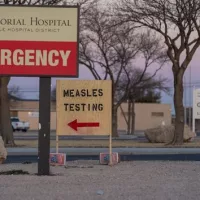
Meyer & Meyer/iStockBy ZOE MAGEE, ABC News
(LONDON) — Oxford University Thursday morning announced more promising news in the development of its COVID-19 vaccine. The results from Phase 2 of its AZD122 vaccine trial, published in the Lancet on Thursday, show that the vaccine is as effective for the older demographic as it is for the younger.
According to the Lancet report, “the vaccine causes few side effects, and induces immune responses in both parts of the immune system in all age groups.” This news was welcomed by the team at Oxford University as a significant next step in its path to producing a viable vaccine against COVID-19, and is particularly important as the elderly demographic is among the most vulnerable to the novel coronavirus.
Researchers are still awaiting data from the much larger Phase 3 trial — the last step before authorization or approval. But for now, researchers are celebrating this reassuring early data.
“The robust antibody and T-cell responses seen in older people in our study are encouraging,” explains the co-author of the study, Dr. Maheshi Ramasamy from the University of Oxford. “The populations at greatest risk of serious COVID-19 disease include people with existing health conditions and older adults.” Adding that, “We hope that this means our vaccine will help to protect some of the most vulnerable people in society, but further research will be needed before we can be sure.”
There were 560 participants in the trial, 400 of whom were in the over 56 years old category and the vaccine was shown to work just as effectively for them as it did for the younger participants. The study also showed that adverse reactions to the vaccine were mild and the most common side effects were injection-site pain and tenderness, fatigue, headache, feverishness and muscle pain.
The Oxford University vaccine, which is being produced in conjunction with the pharmaceutical company Astra Zeneca, was an original front runner in the race for a vaccine but it has since been outflanked by both Moderna and Pfizer/BioNTech which both announced their Phase 3 trial results in the last couple of weeks.
Those two vaccines use a similar technology known as mRNA. These vaccines’ genetic codes introduce an instruction manual comprised of genetic material called RNA or DNA. This instruction manual tells your cells to start churning out a protein normally found on the outside of the virus. When your body senses that viral protein, it activates an immune response.
These mRNA vaccines can be manufactured quickly but could face more distribution challenges and be slower to distribute than the Oxford vaccine. The Pfizer/BioNTech vaccine needs to be stored and transported at extremely low temperatures — around -94 degrees Fahrenheit — which means distribution to some parts of the world could be problematic. Similarly, the Moderna vaccine must be kept frozen — but only at -4 degrees Fahrenheit — but could be easier to ship as it can be kept for up to 30 days in a normal refrigerator.
The Oxford University vaccine, if proved successful, is expected to be much easier to transport as it only requires standard refrigeration. It follows a different type of science and is known as a viral vector vaccine. This mean it uses a different virus as a “vector,” or delivery mechanism, to introduce a bit of coronavirus’ genetic material for coronavirus antigens into the cells, prompting an immune response, which your immune system then learns to identify and overcome.
Having published its Phase 2 results on Thursday, Oxford is a step behind its rivals and many are wondering why Oxford’s results are slower in coming, especially as virus levels are high in the areas it is being tested including in the U.K., South Africa and Brazil.
Oxford’s much anticipated Phase 3 results are expected within weeks and should conclusively show whether this vaccine is effective and safe across the board.
The scientists involved in the research conceded Thursday that there were some limitations in the Phase 2 part of Oxford’s trials. They began during a national lockdown in the U.K. so it wasn’t possible to recruit volunteers from the most vulnerable groups.
“The study includes only healthy participants and not those with co-morbidities or who are frail,” the Lancet reports.
The study’s participants in the oldest age group had an average age of 73 to 74 and few had underlying health conditions, so the older age bracket was excluded as were those living in residential care homes. Nor was there a wide range of backgrounds in the trial participants and “almost all participants of all ages were white and non-smokers.”
The next phase of the trials will therefore focus on these groups.
“Larger studies are now underway to evaluate immunogenicity, safety and efficacy in older adults with a wider range of comorbidities,” the Lancet report notes.
Professor Sarah Gilbert, a co-author of the report and professor of vaccinology at Oxford University, pointed to these limitations: “The WHO has outlined a number of critical factors for COVID-19 vaccines, including that they must be targeted at the most at-risk groups including older adults. They must also be safe, effective in preventing disease and/or transmission, and provide at least six months of protection for people frequently exposed to the virus – such as healthcare workers.”
She notes that while Thursday’s results are a definite step in the right direction, further evidence is needed before any concrete judgement can be made on their vaccine candidate.
“Our new study answers some of these questions about protecting older adults, but questions remain about effectiveness and length of protection, and we need to confirm our results in older adults with underlying conditions to ensure that our vaccine protects those most at risk of severe COVID-19 disease,” she said.
Although there is still more work to be done, the research team was encouraged by Thursday’s results.
“Immune responses from vaccines are often lessened in older adults because the immune system gradually deteriorates with age, which also leaves older adults more susceptible to infections,” noted Professor Andrew Pollard, University of Oxford, who was the study’s lead author. These Phase 2 results show that this was not the case for the Oxford vaccine.
In a statement given to ABC News, Astra Zeneca also stressed the importance of these findings.
“It is essential that a COVID-19 vaccine can be effective across a broad age range particularly in older individuals where they are disproportionately at risk of COVID-19 disease. The Phase 2 interim data for AZD122 suggests that individuals have lower reactogenicity whilst still maintaining a robust immune response,” said Mene Pangalos, executive vice president of BioPharmaceuticals Research and Development.
Copyright © 2020, ABC Audio. All rights reserved.















